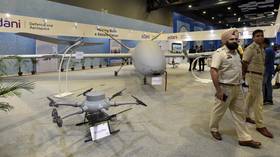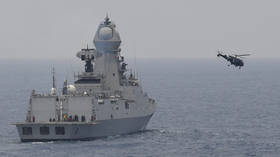Indian Navy gets domestic drones amid Red Sea crisis

The Indian Navy received an initial batch of four domestically produced Medium Altitude Long Endurance (MALE) drones on Wednesday. The acquisition is expected to bolster the navy’s maritime capabilities, particularly in light of escalating tensions in the Red Sea and the Arabian Sea, marked by attacks from Somali pirates and Houthi rebels targeting passing merchant ships.
The Drishti 10 Starliner drones are manufactured locally by Adani Defense and Aerospace, owned by tycoon Gautam Adani, in partnership with the Israeli firm Elbit. They are considered an Indian equivalent of the Israeli Hermes StarLiner. These India-made drones have around 70% indigenous components, according to media reports.
About ten months ago, the Adani Group secured a contract to supply four advanced drones – two for the army and two for the navy – through an emergency procurement mechanism. Media reports suggest that the Indian military is eyeing the acquisition of an additional 150 MALE drones.
The induction of these new UAVs is anticipated to occur “probably next month” after personnel undergo training on their operation, according to R. Hari Kumar, the chief of naval staff.
#WATCH | On Drishti 10 Starliner drones manufactured by Adani Defence, LT Gen Ajay Kumar Suri, DG, Indian Army Aviation says "Initially, we have ordered two Drishti 10s and we are looking at a time span of 2-3 months when they will be delivered. It will improve the surveillance… pic.twitter.com/kv2Y9AbJgN
— ANI (@ANI) January 10, 2024
Addressing a launching ceremony at the Adani Aerospace Park in Hyderabad, Kumar highlighted the importance of these drones, especially considering the sizable UAV inventory held by India’s immediate neighbors, likely referring to Pakistan and China. Kumar emphasized that the new drones will significantly enhance India’s maritime capabilities at a critical juncture when New Delhi has committed to bolstering security in the Arabian Sea, where merchant ships face threats from Somali pirates and Houthi rebels.
The Indian Navy currently operates tactical drones alongside the four US-made High Altitude Long Endurance (HALE) drones known as ‘Sea Guardians,’ the maritime variant of the Predator MQ9 drone. The new Drishti drones will be flown from Hyderabad to Porbandar in Gujarat on the west coast for deployment in naval maritime operations, media reported.
Earlier, the Indian Navy said it was continuously monitoring the maritime security situation in the Arabian Sea, with warships and aircraft on standby for security operations in the region. Around ten Indian guided missile destroyers are currently patrolling the crisis-stricken region.
The Indian Navy chief reiterated on Wednesday that the country is actively deploying its warships to deter pirate activities, particularly against Israeli-owned vessels. “Over the past 42 days, as many as 35 such attacks (approximately) have taken place, primarily targeting Israeli-owned vessels. However, no India-flagged vessel has been attacked so far,” he said, as quoted by the news agency ANI.
In recent incidents, the Indian Navy intercepted a hijacked merchant ship off the Somalian coast, rescuing 15 Indians on board. Earlier, it answered a distress call, leading to the evacuation of an injured crew member from another hijacked vessel, the Maltese-flagged MV Ruen.
Last month, a Japan-owned and Liberia-flagged vessel, MV Chem Pluto, with 20 Indians on board, came under attack from suspected drones 400 kilometers west of the Indian coast. The ship was brought to the Indian port in Mumbai to identify the origin of the attack. Following the MV Chem Pluto incident, Indian Defense Minister Rajnath Singh promised “strict action” against the attacks and resolved to collaborate with allies to safeguard the region.
Where India Meets Russia – We are now on WhatsApp! Follow and share RT India in English and in Hindi













